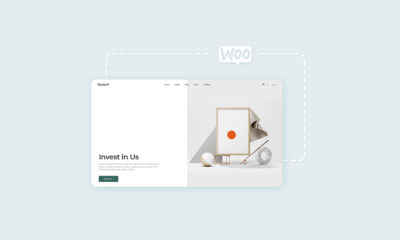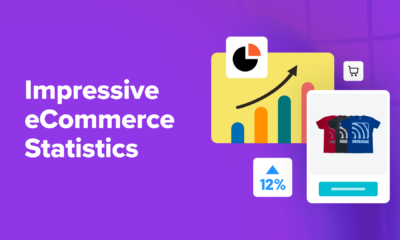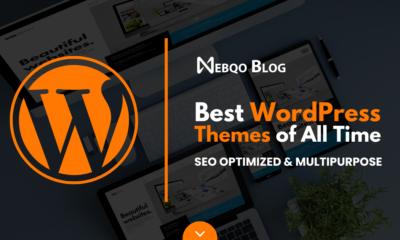In our featured August webinar, we’ll explore using the Site Editor to customize every part of your website.
WORDPRESS
Explore Customization Tools in Our Upcoming Webinar – WordPress.com News

It wasn’t long ago that customizing your website meant outsourcing your design to an experienced developer or learning to code for yourself. Times are changing, though. With the new WordPress.com block editing tools, you’re able personalize all aspects of your site with point-and-click simplicity.
Learn how by joining us for August’s featured webinar: Site Editor vs. Page Editor: Using the Power of WordPress Editing Tools to Create Your Entire Site.
In this live tutorial, we’ll introduce you to the new WordPress.com Site Editor, which allows you to customize your website from top to bottom—no special coding skills needed.
Whether you’re a new or seasoned site owner, our experts will guide you through:
- Distinguishing the site editor from the page and blog post editor
- Locating and editing block theme templates
- Assigning a new template to revamp your page or post appearance
This webinar is 100% free. All you need is a working knowledge of the WordPress.com dashboard and an eagerness to master site editing. Don’t forget to bring along your questions for our live Q&A session after the presentation!
Check out our other August webinars
We’ve prepared an exciting range of webinars this month to help you explore the vast potential of the WordPress.com editing tools and understand the importance of a custom domain for your website. These sessions are designed to arm you with the necessary skills to take your WordPress.com site to new heights!
Mastering Custom Domains
Establish a unique online identity that mirrors your brand and sets you apart from the crowd. Come along with us as we walk you through the process of selecting, registering, and associating a custom domain with your WordPress.com site. In addition, you will learn how a domain-specific email address can positively impact your email open rates.
Site Editing: Custom Headers
This session will demonstrate how you can effortlessly craft an outstanding header without needing to write any code. Whether you’re an entrepreneur or a zealous blogger, this webinar is intended to give you the ability to create headers that truly symbolize your brand and connect with your target audience.
Be a part of our WordPress.com live webinars, deliberately designed for both novice and experienced website owners. All our webinars are open to attend at no cost and wrap up with a vibrant Q&A session, allowing you to engage in meaningful conversation with our expert Happiness Engineers.
Join 100,910,097 other subscribers
WORDPRESS
Understanding Content Management Systems (CMS): Streamlining Your Digital Content

Imagine trying to update your company website the “old-fashioned” way—editing raw HTML code, wrestling with layouts, and manually uploading files. Sounds like a nightmare, doesn’t it? Thankfully, there’s a better way: Content Management Systems (CMS).
A CMS acts like a powerful toolkit, making it easy to create, update, and manage your web content, even if you’re not a coding whiz. Think of it as the control panel for your website’s engine!
To help you navigate the world of content management, we’ll explore what a CMS is and why you need one.
We’ll also explore different popular CMS options to fit your needs, guide you through choosing the perfect CMS, and share some best practices to get the most from your system.
What is a content management system (CMS)?
In simple terms, a Content Management System (CMS) is a software application that makes building and maintaining a website a breeze. It provides a user-friendly interface for creating, editing, and publishing content without needing in-depth coding knowledge.
Think of it like this: a CMS separates the “behind-the-scenes” technical stuff from the actual content creation and management process. You get tools to write text, add images, format your pages, and hit “publish,” while the CMS handles all the code that makes your website function.
Key components of a CMS
Under the hood, a CMS typically consists of a few core components that work together seamlessly:
- Content creation and editing tools: A CMS gives you an intuitive interface similar to familiar word processors. These editors let you write, format text, and add images and videos without needing to touch code.
- Template and theme library: Many CMSs also offer a library of pre-designed templates and themes. These can include templates for various post formats and pages on your site. Templates provide the basic structure and style of your website, allowing you to maintain a consistent look and feel.
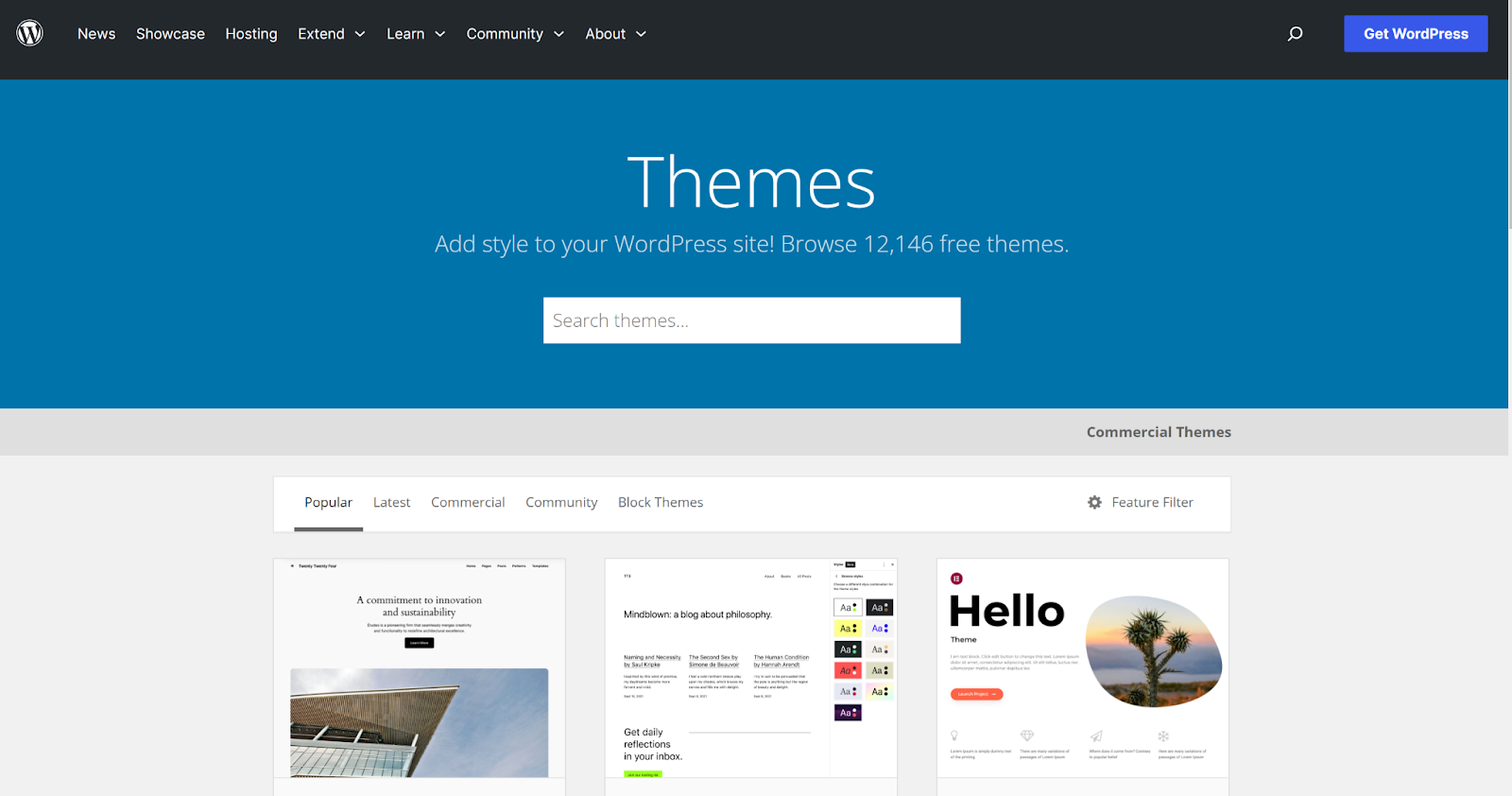
- Content storage and organization: Your CMS uses a database to store all content in a structured way, making it easy to find, update, and reuse. Features such as tagging, categories, and search functions help you keep your content neatly organized and easy to navigate for both you and your visitors.
- User management and access control: A good CMS lets you define different user roles (like administrator, editor, contributor) and set permissions for what each role can do. This ensures that the right people have the right level of access to your content.
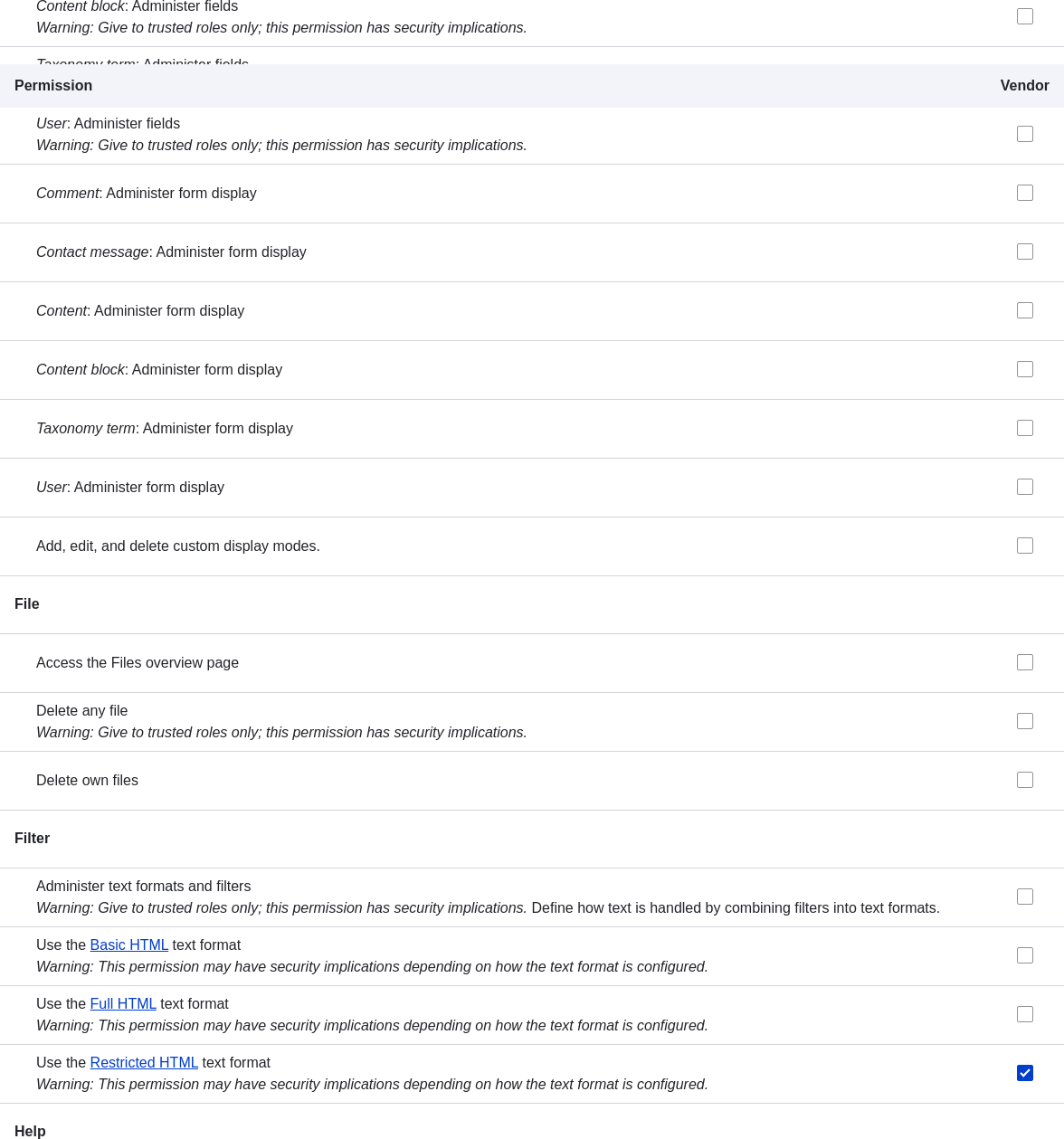

- Version Control: This feature allows you to track changes to your content over time and revert to previous versions if needed, acting as a safety net for your website.
- Publishing and distribution capabilities: Once your content is ready, the CMS handles the technical side of making it live on your website. It can also help distribute your content to other channels, like social media or email newsletters.
Certain content management systems also have scheduling tools, allowing to prepare content in advance and have it automatically published at a specific date and time.
Types of content management systems
While the core idea is the same, not all CMS platforms are created equal. There are different flavors tailored to specific needs.
Web Content Management Systems (WCMS)
This is the most common type of content management system. A WCMS is specifically designed to help you build and manage traditional websites. They focus heavily on the creation, organization, and publishing of web pages, blog posts, and other web-based content.
Examples
Some of the most well-known examples of WCMS platforms include:


This is the most popular CMS worldwide, known for its ease of use, huge community, and vast collection of themes and plugins. It’s great for both simple sites and complex projects.
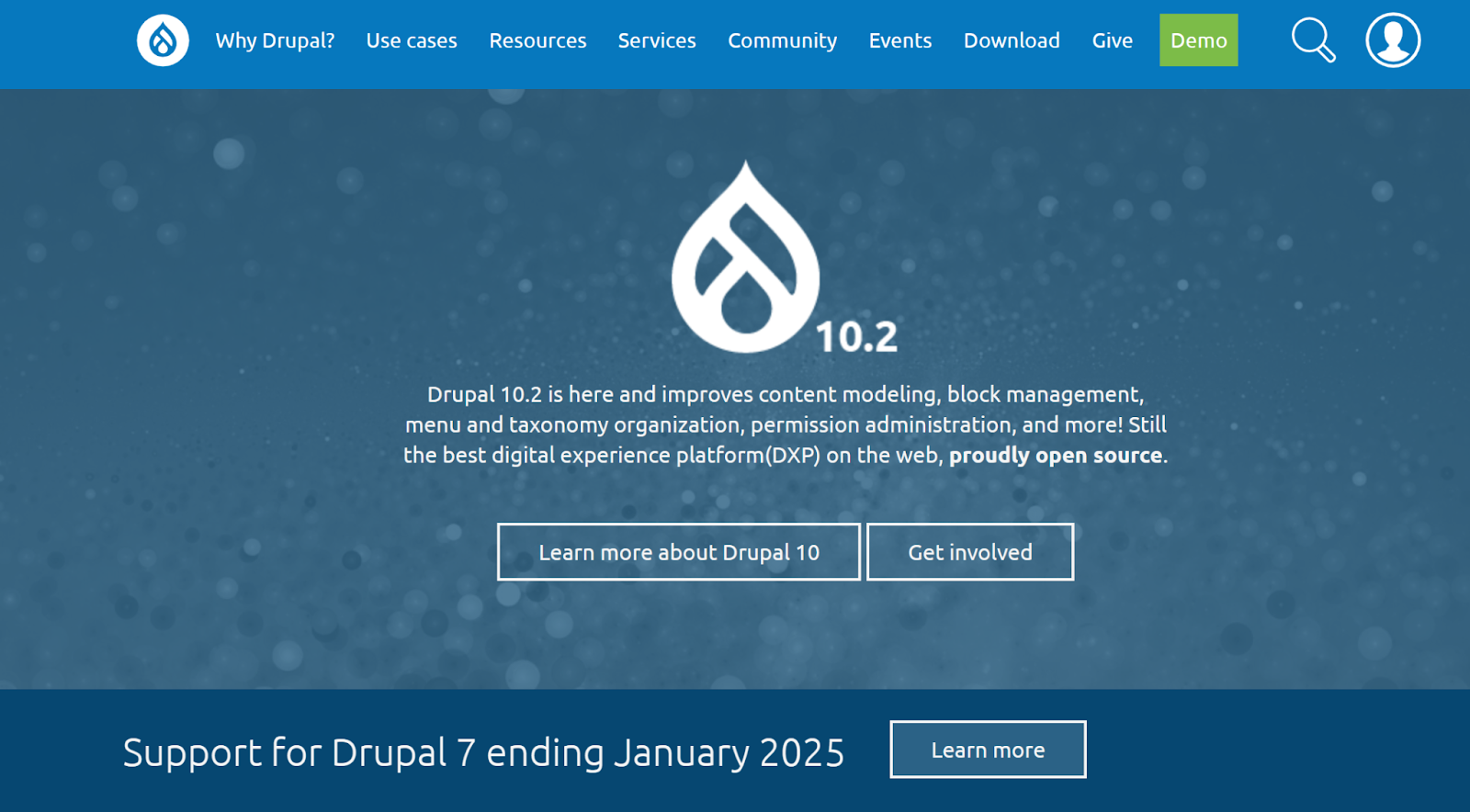

A powerful CMS favored by developers for its flexibility and customization options. Often used for websites with complex data and security needs.
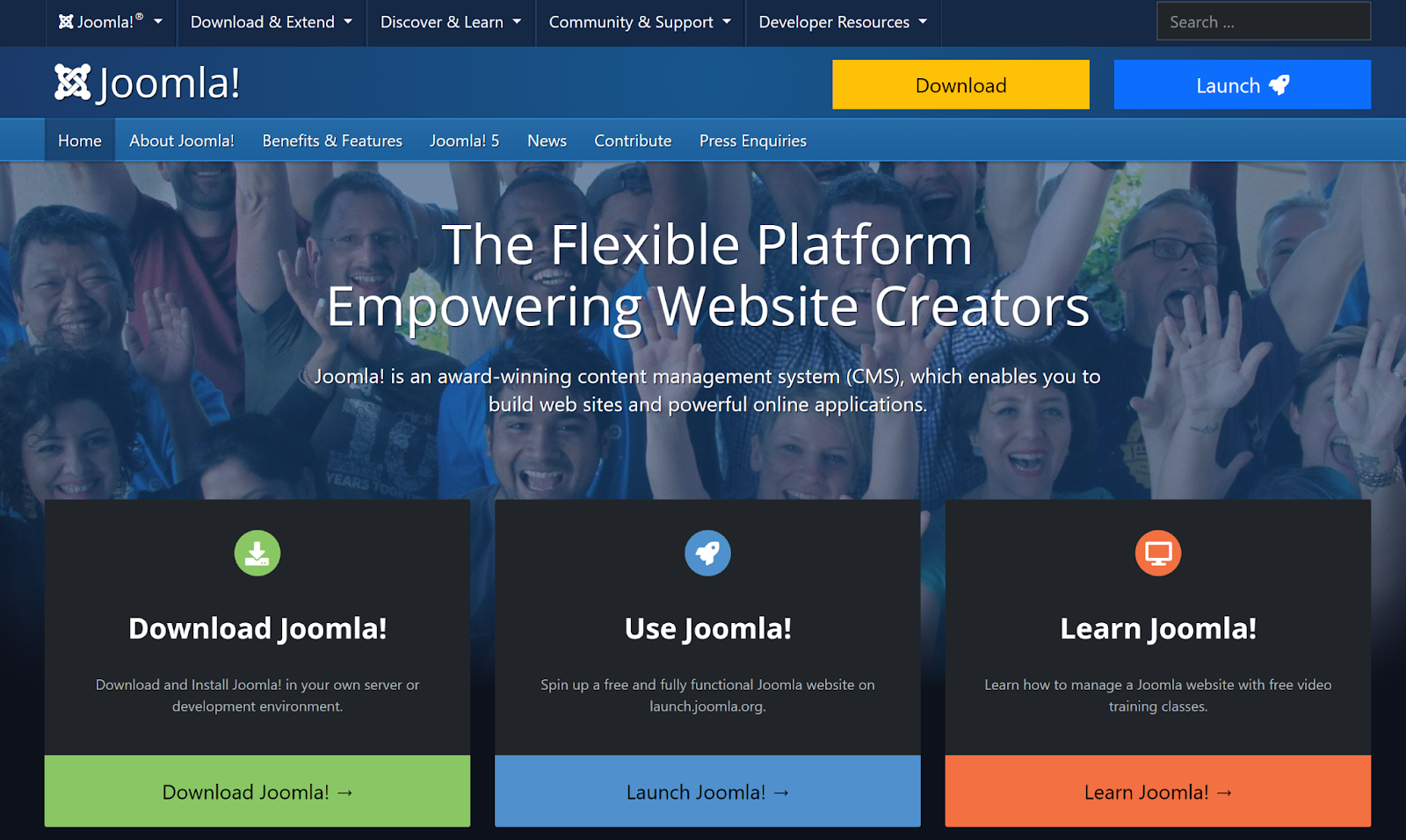

Joomla! falls somewhere between WordPress and Drupal in terms of complexity. It offers a good balance of user-friendliness, multilingual support, and advanced user and content options.
Enterprise Content Management Systems (ECMS)
ECMS platforms cater to the needs of large organizations. They go beyond website management to handle a company’s vast range of digital assets and information. These systems help you with large-scale content storage, workflow automation, document management, and collaboration across your organization.
Examples
Popular examples of ECMS platforms include:
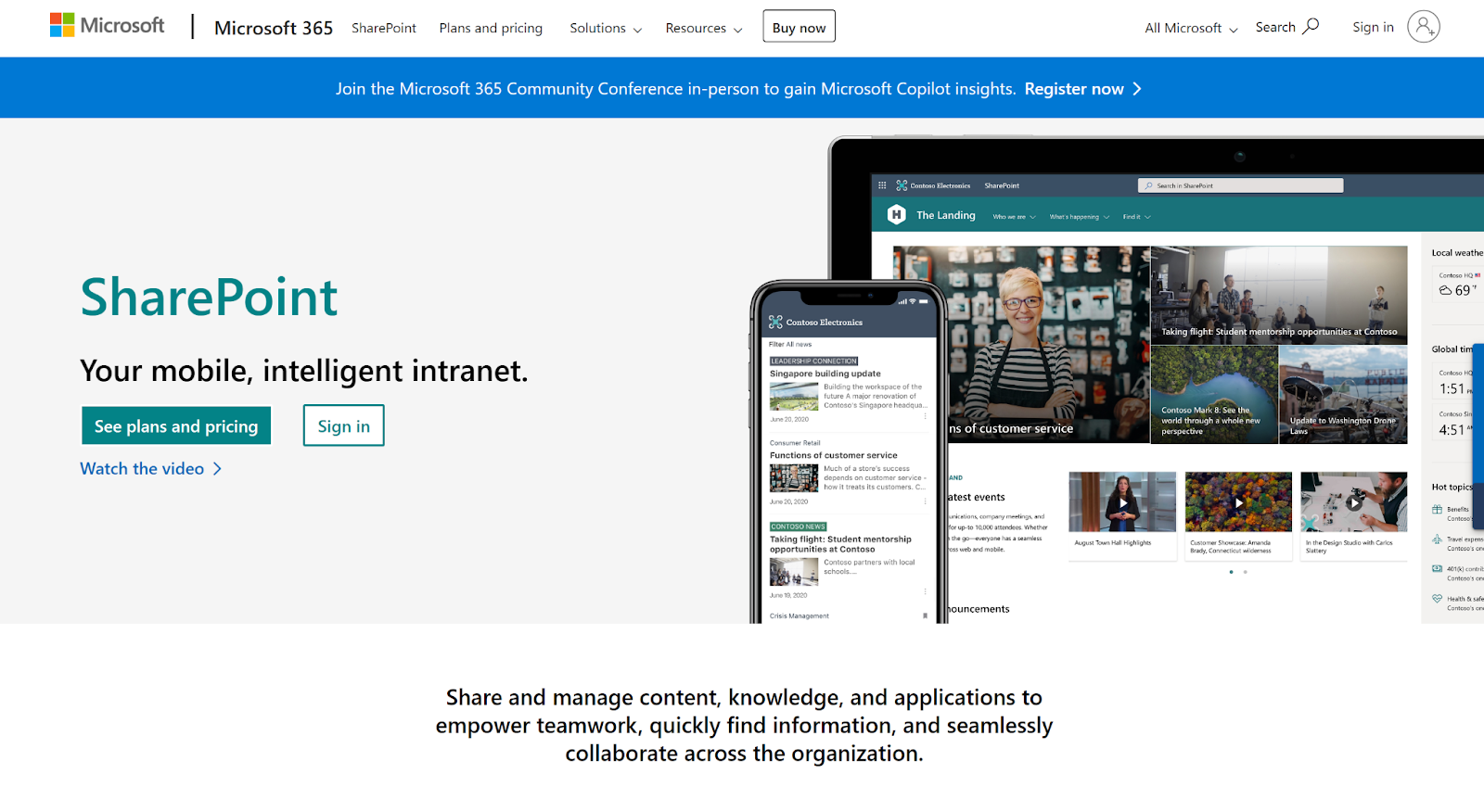

Sharepoint is a Microsoft-developed content management platform that focuses on collaboration, file sharing, and private network creation within organizations.
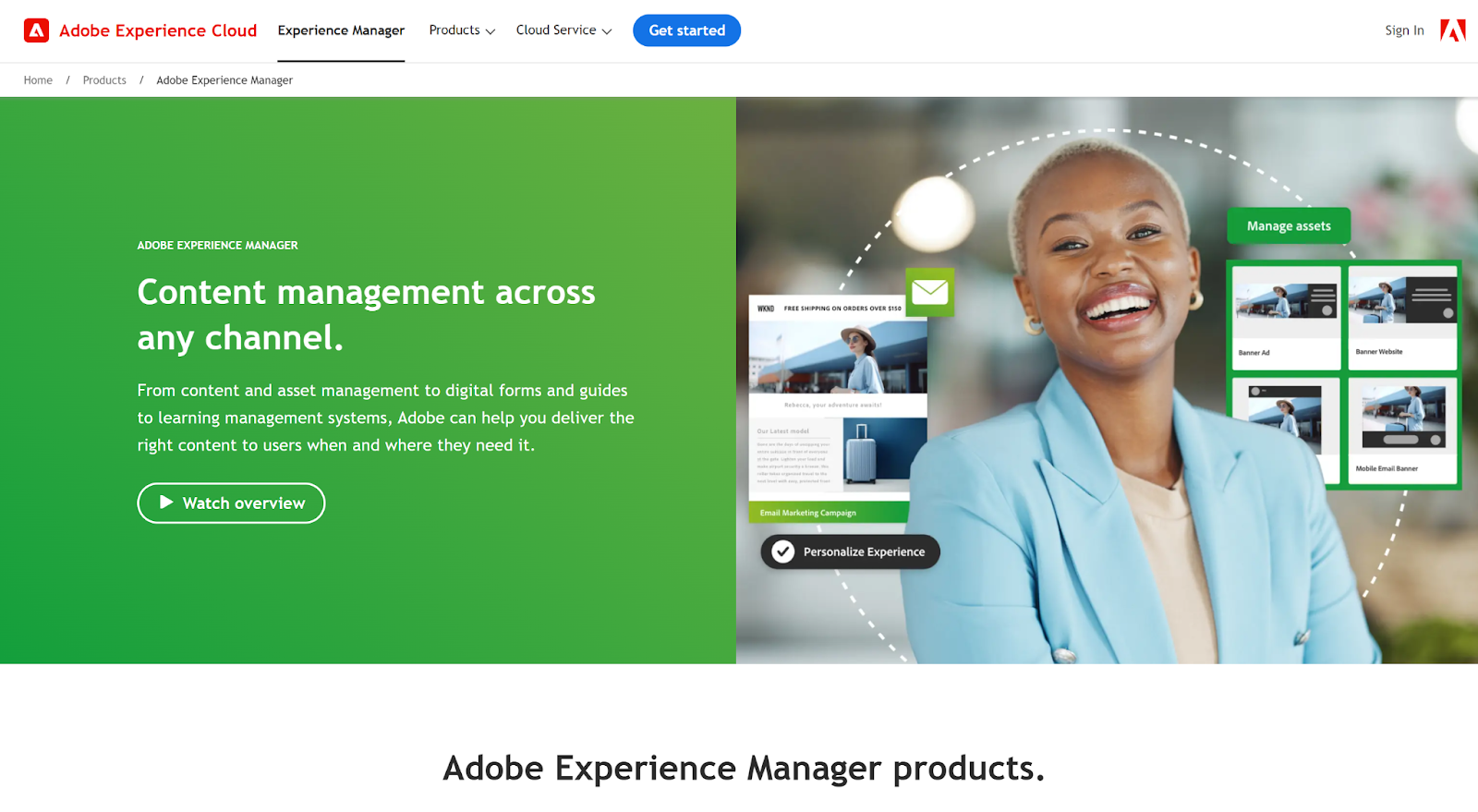

Adobe Experience Manager (AEM) is a content management system that offers businesses tools for designing, editing, and publishing content across various platforms, such as websites and mobile apps. This streamlines both your and your customers’ experiences.
Learning Content Management Systems (LCMS)
These systems go beyond simple content management and offer features tailored to e-learning. An LCMS is designed specifically for creating, delivering, and tracking online courses and training materials. It also analyzes data on learner performance to help you improve your course’s effectiveness.
Examples
Here are some popular LCMS platforms:
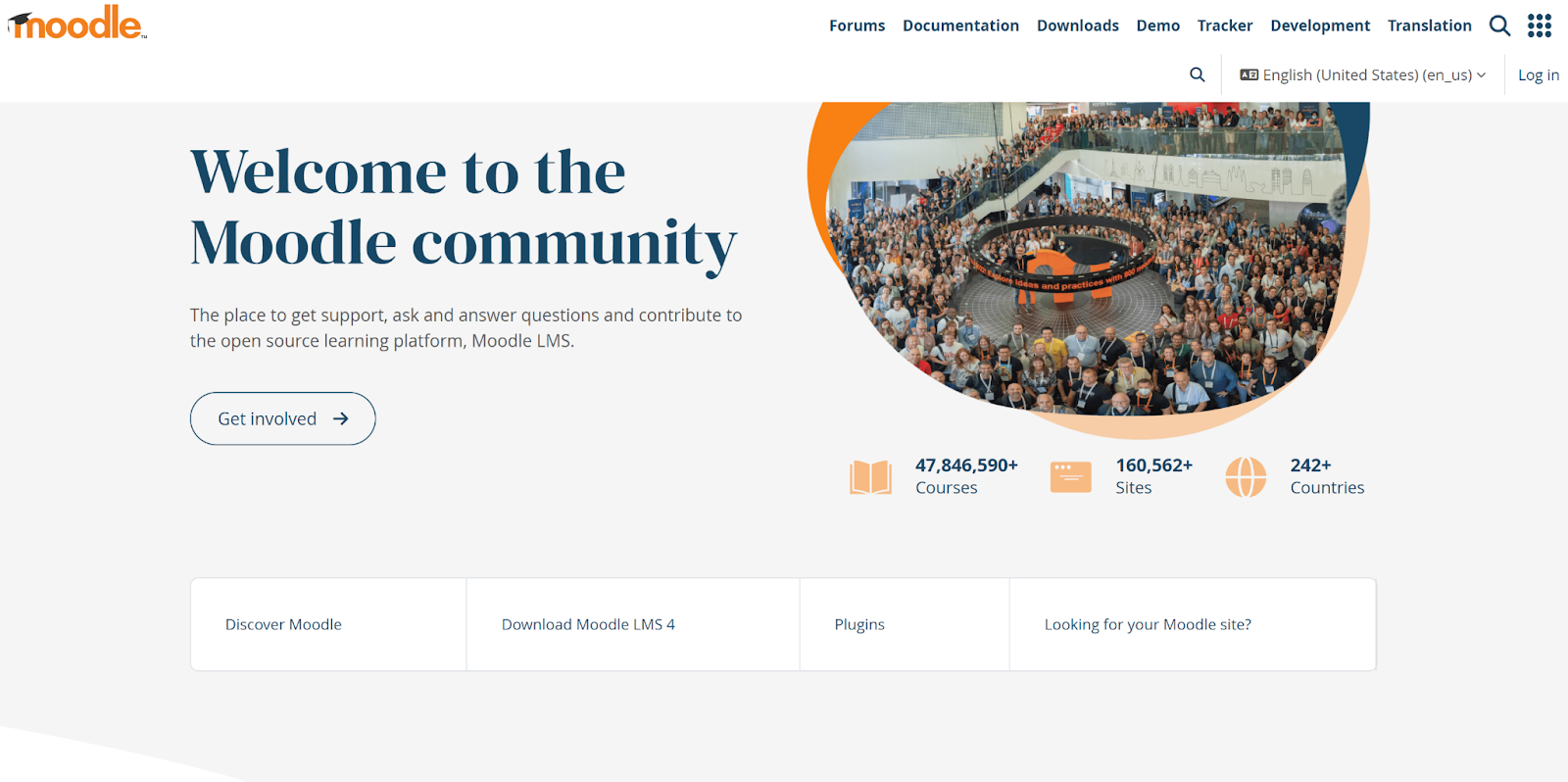

Moodle is a free and open-source LCMS used by schools, universities, and businesses. It’s known for its flexibility, adaptability, and strong community support.
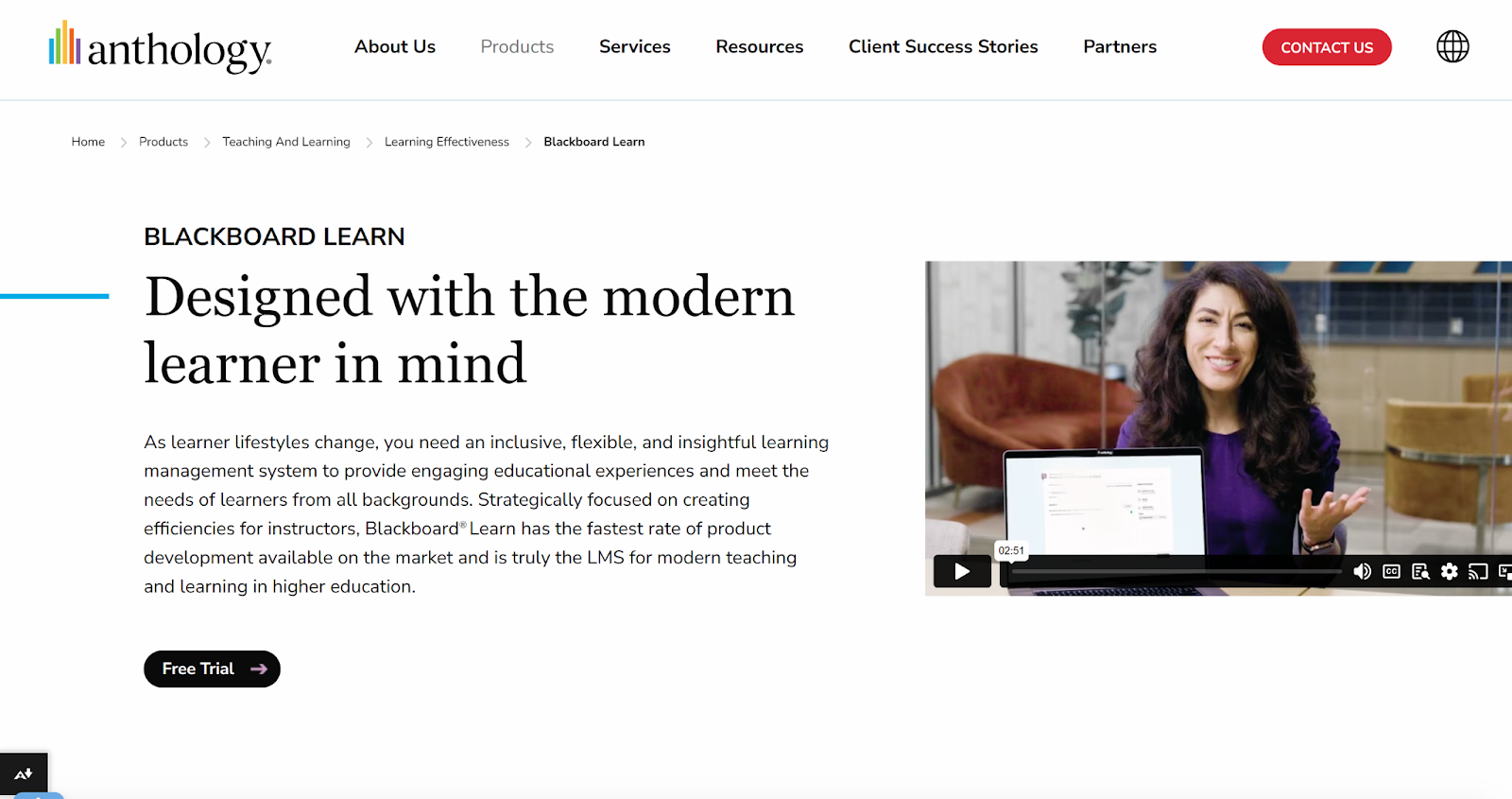

Blackboard, now Anthology, is a comprehensive LCMS widely used in higher education. Offers a wide range of features, such as AI assistants and accessibility tools, and caters to large institutions.
Benefits of using a content management system
Investing in a CMS unlocks a wide range of benefits for businesses, organizations, and individuals. It streamlines workflow, boosts your team’s efficiency, and enhances your online presence.
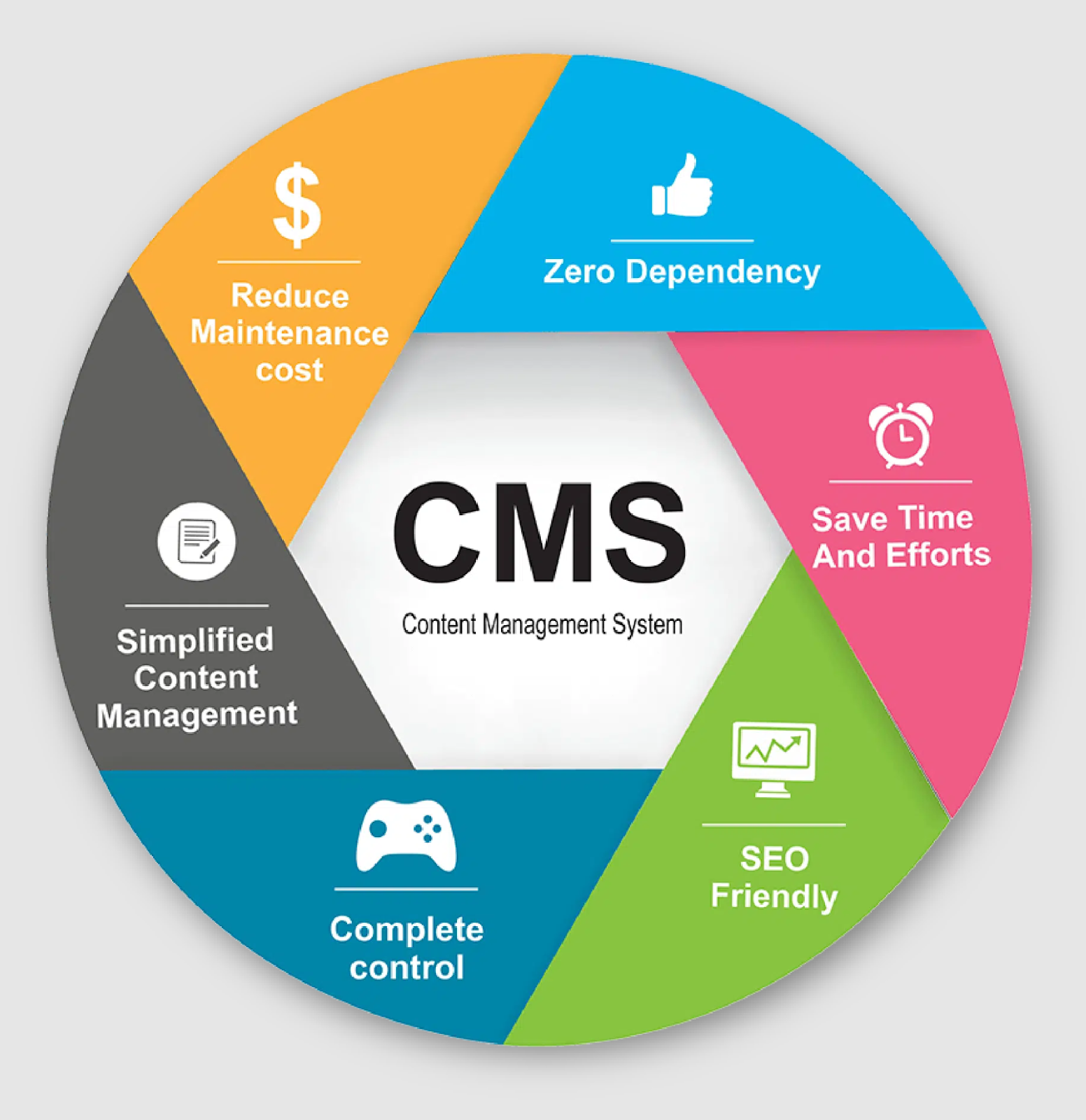

- Streamlined content creation and publishing
A good content management system transforms the process of creating and publishing content into a smooth, stress-free experience. CMS platforms offer intuitive interfaces and tools that dramatically simplify the process of creating and publishing web content. Forget fiddling with complicated code!
Its editors and tools let you focus on crafting your message, whether it’s a captivating blog post, a product description, or even an online course. Getting your content live is as simple as clicking a button.
- Improved collaboration among team members
Many CMS solutions have built-in collaboration features. It allows multiple people to work on content simultaneously, whether they’re in the same office or across the globe. With features like user roles, version control, and in-line commenting, a CMS eliminates messy email chains and version conflicts. Everyone stays on the same page, ensuring a smooth and efficient collaborative process.
- Consistent branding and design across digital properties
A strong brand is about consistency. A CMS helps you present a unified look and feel across all your pages. Customizable templates ensure that your website, blog, social media posts, and even email newsletters share the same colors, fonts, and overall styling. This consistency builds brand recognition and makes your business instantly recognizable to your audience.
- Enhanced security and access control
Protecting your website’s content and user data is crucial. A well-maintained CMS comes with robust security features and regular updates to patch vulnerabilities. User roles and permissions let you control who can view, edit, and publish content. This way, you have peace of mind knowing sensitive information is protected from unauthorized access.
- Scalability and flexibility for future growth
A CMS can easily grow with your website as it evolves. It can easily handle increased traffic, more content, and new features. Whether you need to add new sections to your website, launch a multilingual version, or integrate with other business tools, a CMS provides the flexibility to adapt and evolve.
- Cost-effectiveness compared to custom-built solutions
Developing a custom website from scratch can be incredibly expensive and time-consuming. A CMS offers a cost-effective alternative, especially with free and open-source options (we’ll tackle this next).
While the initial setup and customization might involve some costs, in the long run, you save money on development, maintenance, and updates.
Choosing the right content management system
With so many CMS options out there, picking the best one for your needs can feel a bit overwhelming. Here are some key factors to consider:
Assessing your organization’s specific needs
Your choice of a content manager should be based on your specific needs, resources, and goals. Why do you want to use a CMS? Do you want to support your business’s growth or improve your team’s work dynamic? Different CMS platforms excel in different areas.
Also, consider your budget. Costs can vary widely between open-source and proprietary solutions, as well as hosted vs. self-hosted options. Next, who will be managing the content? Consider your or your team’s technical skill level and match it with the ease of use offered by different content management systems.
Open-source vs. proprietary solutions
When choosing a content management system, you’ll often decide between open-source and proprietary solutions.
Open-source CMSs (like WordPress, Joomla, and Drupal) offer their source code freely, allowing for high levels of customization and community support. They are often more affordable, as you primarily pay for hosting and any additional development.
Proprietary CMS on the other hand are owned by a company and require licensing fees. They typically offer robust support and enhanced security features. They’re more popular with businesses that require more advanced features and support. Examples of proprietary solutions include Adobe Experience Manager and SharePoint.
Ease of use and learning curve
How user-friendly is the interface? Will your team need extensive training, or can they quickly get up to speed? Well-designed CMS platforms offer user-friendly interfaces and require minimal technical knowledge. While there might be an initial learning curve (especially for more complex systems), many content management systems provide extensive documentation, tutorials, and active communities to help you along the way.
Integration with existing systems and tools
Your content management system should also play nicely with your content calendars, marketing software, social media, and other tools. The best platforms easily integrate with other tools you use to run your business.
These integrations help streamline your workflows, avoid data duplication, and give you the entire picture of your online presence.
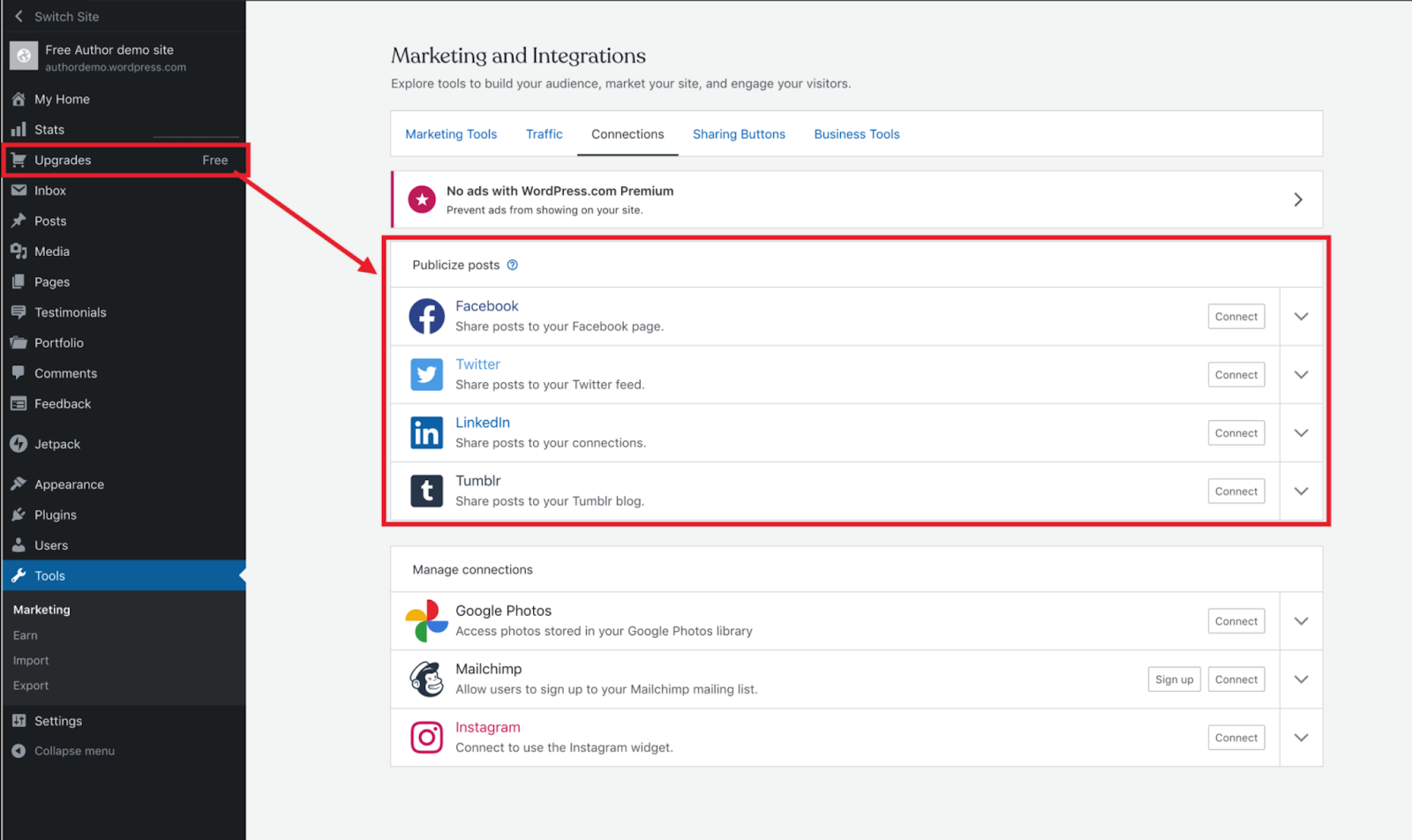

Community support and resources
Popular content management systems, especially open-source ones, often have vibrant communities of users and developers. This means you’ll never be short of help and resources.
There are extensive online forums, documentation, tutorials, and even third-party companies specializing in CMS support. This community support can save you time, frustration, and money when tackling challenges or exploring new features.
Scalability and performance considerations
As your website grows and attracts more traffic, it’s important to choose a CMS that can scale accordingly. Some factors to consider include:
- Hosting: Look for a hosting provider that can adapt as your site’s resource needs increase.
- Optimization: Features like content caching and image optimization help boost website performance, even under heavy load.
- Scalability Architecture: Some CMSs are inherently better designed to handle large-scale websites with millions of visitors.
Implementing and maintaining a content management system
Now, successfully using a CMS goes beyond creating an account or installing the software. It involves careful planning and constant monitoring and improvement.
To maximize your content management system, you need to have a clear implementation plan.
Planning and strategy development
As mentioned earlier, you need to identify what you want to achieve with your CMS. What are the primary reasons you’re implementing a CMS? Be specific!
Do you want to streamline content updates, improve website design, enhance collaboration, or support business growth?
Then, align your content strategy with your overall business goals. For example, if you want to make your brand more visible, then your strategy should focus on creating engaging and valuable content.
Next, take stock of your current situation. Audit your existing content, identify strengths and weaknesses, and determine which types of content (blogs, videos, product pages, etc.) will be most important on your new site.
Then, identify key performance indicators (KPIs) that will help measure your success. This can be metrics like page views or click-through rates.
Technical Considerations
Don’t forget to consider technical requirements. Will your CMS need to seamlessly integrate with your email marketing software, CRM system, or other business tools?
Also, think about hosting. Shared hosting might be enough for a small site, but a larger, more complex site could benefit from dedicated hosting resources.
Finally, set a realistic budget and timeline. Account for the cost of the CMS itself (if using a proprietary option), as well as setup, customization, content migration, and any ongoing support costs.
Content migration and organization
If you have an existing website, migrating your content to the new CMS is a crucial step. This process requires careful planning to ensure everything transfers smoothly and your website’s functionality is preserved.
Start with a content audit. Analyze your existing pages to determine what content is still valuable, what you might want to update, and what you might discard entirely. This is a great moment to streamline your content and eliminate outdated information.
Then organize your content by removing duplicates and grouping the remaining content according to topic or theme.
Tip: Test your migration process on a small portion of your content before migrating the entire site. This can help you catch and address any potential problems before they become major issues.
Customization and extensibility
Most CMSs offer a library of pre-designed templates or themes. These give you a starting point for your website’s design and can often be customized further to match your brand’s colors, fonts, and overall aesthetics.
You can also extend the CMS’s core functionality with plugins or extensions. These can add features like e-commerce, contact forms, advanced analytics, and more.
For complex features, unique integrations, or to perfectly align your website’s look and feel with your brand, you might require custom development. Assess your needs and whether hiring a developer makes sense.
Training and user adoption
Successful CMS adoption depends heavily on providing your team with the knowledge and confidence to use the system effectively. Start with comprehensive documentation. Provide your team with written manuals or step-by-step videos that cover the system’s features.
You can also offer personalized training, especially to users who regularly use the CMS. These training sessions can be tailored to their specific roles.
For instance, content creators may need to focus on creating different types of content, using the visual editor, and image optimization. Admins might delve into user management, security settings, and analytics.
Don’t underestimate the importance of ongoing support. Establish clear channels where users can ask you questions and get help quickly, whether it’s via email or your team’s communication platform.
Regular updates and security patches
A CMS is much like any software – it needs regular attention to ensure security and optimal functionality. Most popular CMSs release frequent updates that may include new features, bug fixes, and crucial security patches that address vulnerabilities.
However, you should still test the system’s features and make sure they work as intended. You should also test whether the system is compatible with different devices and browsers. Make sure to document any bugs you find.
Performance monitoring and optimization
A fast-loading, responsive website is crucial for user experience and search engine rankings. Regularly monitor your website’s performance using tools like Google Analytics or dedicated speed testing platforms. Watch for metrics such as page load times, bounce rates, and identify any slow-loading pages. To optimize performance, consider:
- Caching: Caching stores a temporary copy of your website, allowing it to load faster on subsequent visits.
- Image optimization: Compress images to reduce file size without compromising quality.
- Content Delivery Network (CDN): This type of network utilizes a global network of servers to deliver content, reducing load times, especially for visitors geographically distant from your main server.
A success story of CMS implementation
Style Girlfriend


Style Girlfriend is an American company that offers men made-to-measure suits. They started out on Tumblr and were purely content-based, earning revenue through affiliate programs. However, one of the founders, Megan Collins, craved a platform that gave them more control but was still easy to use. With their focus on content, it was only natural for them to turn to WordPress.
Their new website displayed recommended products using WooCommerce, WordPress’s commerce service. In 2020, they offered two services: style consultation and shopping plan.
According to Megan, “With WooCommerce, we’ve been able to easily extend our offerings. For example, we’re now using a plugin that allows our customers to purchase and redeem gift cards.”
With the combined power of WordPress and WooCommerce, Style Girlfriend is thriving with content, product recommendations, and personalized styling services. The brand is poised for rapid growth with the support of its flexible CMS foundation.
Future trends in content management systems
The world of content management is constantly evolving. Here are some fascinating trends shaping the future of CMS platforms:
Artificial Intelligence and machine learning integration
AI and machine learning are poised to revolutionize content management. Imagine a CMS that can automatically tag images, suggest SEO optimizations, translate content, or even help generate drafts. These capabilities will streamline workflows and unlock new levels of efficiency.
Personalization and customer experience optimization
Delivering personalized content is becoming vital for success online. Future CMS platforms will likely harness AI to analyze user data, providing tailored content recommendations, dynamic web experiences, and targeted marketing efforts.
Integration with emerging technologies (AR, VR, IoT)
Content is rapidly extending beyond websites. Think about interactive instructions popping up as you hold your phone over a product (AR), exploring a virtual museum with details projected next to exhibits (VR), or your smart thermostat receiving custom settings. These immersive experiences blend the physical world with digital content.
This is where content management systems (CMS) are evolving. They traditionally focused on websites, but the future CMS needs to manage all types of content designed for AR, VR, and Internet of Things (IoT) devices. This could include 3D models for virtual demonstrations, interactive overlays for AR experiences, or even instructions for smart appliances.
Final thoughts
A content management system (CMS) is a powerful tool that simplifies website management, streamlines content creation, and enables collaboration. It can empower you and your business to establish a strong online presence without going deep into the technicalities. If your organization hasn’t yet adopted a CMS, now is the time!
As technology continues to advance, the future of content management systems looks incredibly promising. The integration of AI, a focus on personalization, and the potential to power immersive experiences make it an exciting time for organizations ready to embrace the next generation of CMS solutions.
FAQs
What is a content management system?
A content management system (CMS) is a software application that makes it incredibly easy to create, manage, and publish the content on your website. You don’t need to know how to code! Think of it as the control panel for your website’s content.
What is an example of a content management system?
One of the most popular examples is WordPress. Others include Drupal, Joomla, and more specialized systems like Shopify (for e-commerce).
How important is a content management system?
Very important! A CMS streamlines the entire process of keeping your website updated and fresh. Trying to manage a website without one would be much more difficult and time-consuming.
What is the most used CMS?
WordPress is the most widely used CMS in the world, powering a huge percentage of websites. Its popularity is due to its ease of use and large community of users and developers.
What are the benefits of using a CMS?
Some top benefits include easier content creation, improved collaboration, better security, greater flexibility, and often, lower costs compared to developing a custom website.
Is using a content management system the best way to develop a site?
For most people and businesses, absolutely! A CMS gives you a powerful toolkit and a solid foundation without needing to reinvent the wheel. There are rare cases where a fully custom site is needed, but that’s usually for very complex or unique projects.
What are the different types of CMS?
There are a few main types:
- Web Content Management Systems (WCMS): Designed for general websites (blogs, business sites, etc.)
- Enterprise Content Management Systems (ECMS): For large companies with a lot of content and complex needs.
Learning Content Management Systems (LCMS): Used for creating and delivering online courses.
WORDPRESS
20 Best WooCommerce Extensions for Your WordPress Shop

It’s a generally good idea to make a customer’s journey from landing on your website to getting what they’re there for as quick and frictionless as possible. Search bars play an important role in removing that friction, and FiboSearch is one of the best search bars for WooCommerce you’ll find.
The free version of the plugin supports search by product title, description, terms, and SKU. It shows product image, price, and description in the results, and allows you to limit the number of suggestions that are displayed. The paid version, which starts at $49 per year, adds synonyms and fuzzy search to the list of features, as well as search for posts, pages, tags, categories, and attributes.
WORDPRESS
13 Best Fun WordPress Plugins You’re Missing Out On

Are you looking to find the best fun WordPress plugins for your website?
Since there are thousands of plugins available on the market, it can be difficult to pick the ones that will actually add a fun and interactive element to your site while boosting conversions.
To make this easier for you, we tested some of the most popular plugins on the internet and examined factors such as ease of use, features, customization, and pricing.
In this article, we will share our list of the best fun WordPress plugins that you may be missing out on.

If you are in a hurry, then you can take a look at our top picks to quickly choose the best fun WordPress plugin for you:
How Do We Test And Review Fun WordPress Plugins?
We installed and tested every plugin from this list on our websites to find their features, pros, and, cons, and provide you with the best recommendations.
While we were doing that, we paid special attention to the following criteria to pick the best fun WordPress plugins:
- Popular plugins: We tested the most popular and best WordPress plugins on the market to see if they can add a fun element to your site. We analyzed those plugins based on ease of use, features, pricing, and customization options.
- Different use cases: There are various ways to make your site enjoyable for users. That is why we reviewed plugins for all kinds of use cases like spin the wheels, giveaways, quizzes, interactive elements, ranking systems, and more.
- Plugins tested by us: We included plugins that we have used on our own websites to boost engagement and add fun elements.
Why Trust WPBeginner?
At WPBeginner, we are a dedicated team of people with over 16 years of experience in WordPress, design, and online marketing.
Our WordPress experts extensively review each plugin or tool that is featured here and thoroughly test them on real websites. To learn more, you can see our complete editorial process.
Having said that, here is our list of the best fun WordPress plugins that you are missing out on.
1. OptinMonster (Spin to Win Optins)
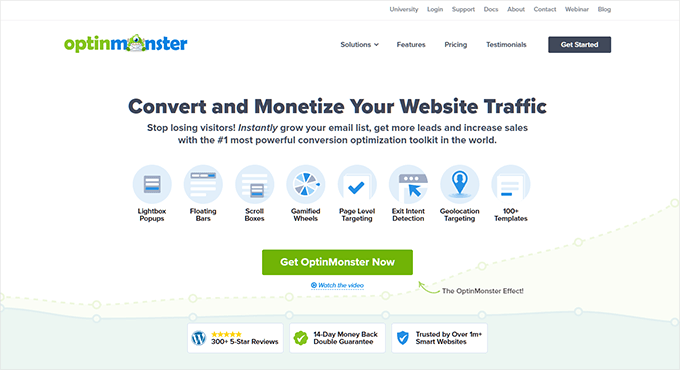

OptinMonster is the best lead generation and conversion optimization tool on the market that lets you create amazing spin-to-win optins. They can add a gamification effect to your website and make it more interactive and fun for your visitors.
Once you have added the wheel, users can enter their email addresses and spin the wheel to win different prizes, such as discount codes and coupons. This can convert website visitors into subscribers and customers.


The software has a drag-and-drop builder and premade templates that make it super easy to build spin-the-wheel campaigns. You can also add dynamic content, countdown timers, CTA, images, and email fields to capture leads.
For detailed instructions, see our tutorial on how to add spin to win optins in WordPress and WooCommerce.
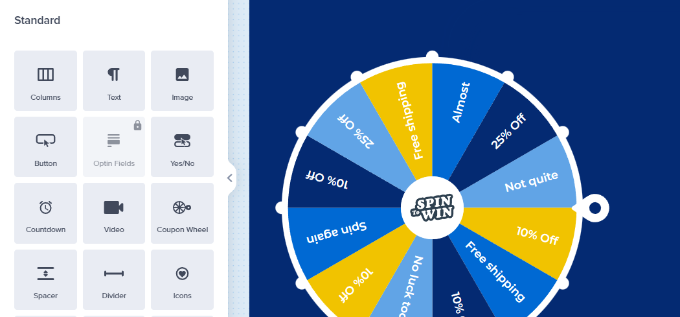

Pros
- You can also create optin forms, popups, floating bars, slide-ins, and banners with OptinMonster.
- The tool can integrate with popular email marketing services and CRM (Customer Relationship Management) software.
- It comes with triggers and display rules like exit intent technology. Upon testing the plugin, we realized that this could help build FOMO (fear of missing out) by showing limited-time offers or exclusive content before a visitor leaves the page.
- The software also offers A/B testing, analytics, and geolocation targeting.
Cons
Why we recommend OptinMonster: It is the best spin a wheel coupon plugin that makes it super easy to add gamification elements to your website. Plus, OptinMonster comes with premade templates and a drag-and-drop builder and also lets you create popups and banners, making it a super fun option.
For more information, you can see our OptinMonster review.
2. RafflePress (Giveaways and Contests)


RafflePress is the best WordPress giveaway plugin on the market. It allows you to host all kinds of contests and giveaways to add a fun element to your site while generating leads.
It comes with a drag-and-drop builder and premade templates. Plus, it allows you to add multiple methods for giveaway entry, including subscribing to your email list, following you on social media, and visiting specific pages.
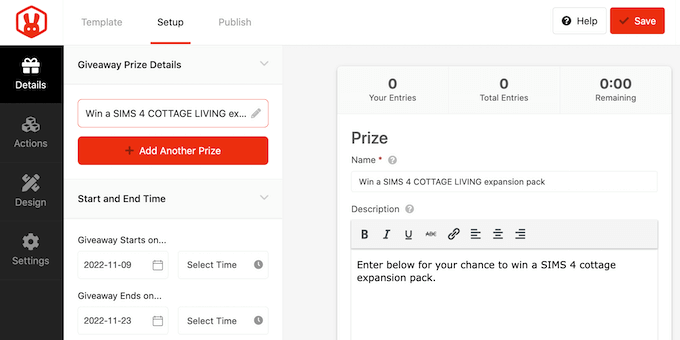

We have actually used the plugin on WPBeginner to run a viral giveaway and found it super easy to use.
For more information, you can see our tutorial on how to run a giveaway/contest in WordPress with RafflePress.
Pros
- RafflePress offers complete fraud protection from spam entries.
- It can integrate with email marketing services, form plugins, and CRMs. This can help you add different entry methods for the contest.
- It comes with a built-in integration with SeedProd. This means that you can add your giveaways on attractive landing pages.
- Some of its other features include success tracking, retargeting, social logins, email verification, and a prize gallery.
Cons
- The plugin has a free plan, but you will need the pro version to unlock more templates and entry methods.
Why we recommend RafflePress: It is a super fun plugin that adds a gamification effect to your website and helps you build your email list or social media followers at the same time. You can bring back more customers and attract new ones by offering freebies or discounts to giveaway winners.
For more details, you may also like to see our RafflePress review.
3. Uncanny Automator (Fun Automated Workflows)
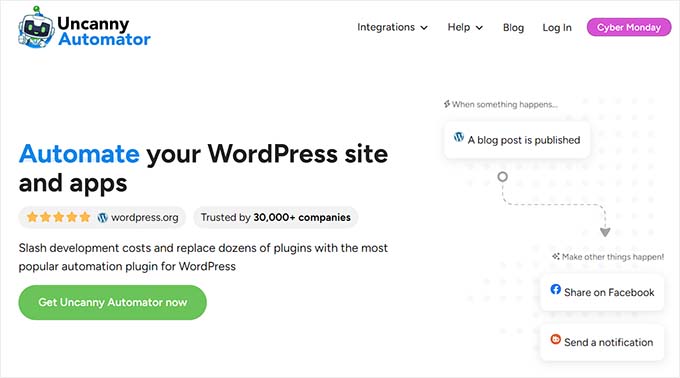

Uncanny Automator is the best automation plugin on the market that acts like Zapier for WordPress. You can use it to create fun, automated workflows for your website.
For example, you might use the plugin to connect your blog with Twitter. Now, every time you publish a new post, it will automatically be tweeted on your handle. This can help boost followers and attract new users.
Similarly, you can send birthday emails with special offers, share user-generated content, or send cart abandonment reminders. To learn more, you can see our tutorial on how to create automated workflows in WordPress with Uncanny Automator.
Pros
- It is a great Zapier alternative that can integrate with 150+ tools, including form builders, Instagram, LinkedIn, Facebook, BuddyPress, and WooCommerce.
- The plugin is easy to use and comes with unlimited recipes and triggers.
- It also has advanced features like delays, scheduling, and user creation.
- During our testing, we discovered that you can connect multiple WordPress sites with it.
Cons
- The plugin has a free plan, but it comes with limited triggers and actions.
Why we recommend Uncanny Automator: It is a super fun plugin that you can experiment with to build different workflows and save time on your website. For instance, you could integrate it with a gamification plugin to reward users for specific actions.
For more details, you may also like to see our Uncanny Automator review.
4. TrustPulse (Build FOMO and Social Proof)
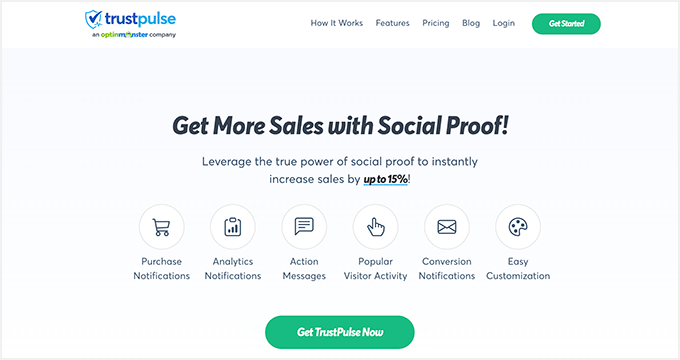

TrustPulse is the best WordPress social proof plugin that lets you build FOMO on your website to boost conversions.
It lets you display a live sale notification in your eCommerce store to real-time visitors, which can motivate them to make a purchase as well.
Other than recent purchases, it can also display bubble notifications for form submissions or free trial sign-ups to encourage users to join your email list.
For more information, you can see our tutorial on how to use FOMO on your WordPress site to increase conversions.
Pros
- The plugin allows real-time event tracking on your website.
- When reviewing the plugin, we noticed that it allows you to customize your notifications to match your brand identity. You can adjust colors, fonts, and animations, and even add custom messages.
- TrustPulse also offers smart targeting, A/B testing, analytics, and exit intent notifications.
Cons
- The plugin does not have a free plan.
- Its analytics feature is basic compared to other tools.
Why we recommend TrustPulse: It is one of the best fun WordPress plugins that can boost sales for your small business by showing social proof to users. This can cause FOMO among visitors, which can lead to more conversions for your online store.
See our TrustPulse review for more information.
5. Chrismasify (Christmas Effects)


Chrismasify is a free WordPress plugin that you can use during the Christmas season to add fun elements to your WordPress blog.
You can add jingle music, snowflakes, and a flying Santa on your website to create holiday spirit. This can motivate visitors to explore your site and even make a purchase if you have an online store.
For more ideas, you can see our tutorial on ways to spread the holiday spirit with your WordPress site.
Pros
- The plugin is completely free and has a user-friendly interface.
- It lets you control the speed of the snowflakes and adds Christmas decorations to images as well.
- We liked that you can also change the heading’s font on your website to add holiday cheer.
- The plugin lets you configure the activation and deactivation dates for the Christmas effects.
Cons
- Chrismasify is just used for adding interactive elements. It cannot help you build an email list or boost conversions.
- The plugin does not have great customer support.
Why we recommend Christmasify: If you are planning a holiday sale, then you can use Christmasify to add some fun elements to your online store. This can spread the holiday spirit on your site and encourage users to make a purchase.
6. Thrive Quiz Builder (Engaging Quizzes)
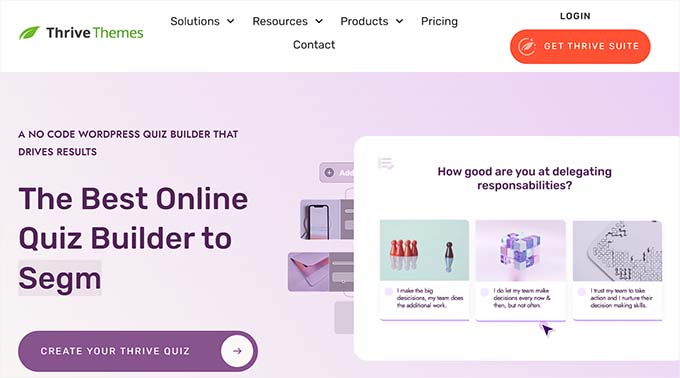

Thrive Quiz Builder is the best WordPress quiz plugin on the market that lets you create all kinds of fun and interactive quizzes without using any code.
It comes with an intuitive drag-and-drop builder and premade templates that you can use to add right/wrong, number, percentage, or personality quizzes.
For example, if you have a travel business, then you could add a quiz that suggests the next destination users should visit based on their hobbies. This can boost engagement and lead to more business for you.
The plugin also offers gamified elements like progress bars, customizable results pages, and social sharing options to further boost user engagement.
For more information, see our beginner’s guide on how to easily create a quiz in WordPress.
Pros
- We particularly appreciated the branching questions feature. If you use this option, then the next question displayed to the users in a quiz will depend on their previous answer.
- Thrive Quiz Builder comes with different question formats like multiple choice, true or false, open-ended, personality, and matching questions.
- Based on quiz results, you can automatically tag users with specific categories or segments within your email marketing platform.
- It is a part of Thrive Themes and can integrate with other plugins like Thrive Architect, Thrive Leads, and Thrive Optimize.
Cons
- Thrive Quiz Builder has no free plan.
- It has a lot of features, which can be confusing for beginners.
Why we recommend Thrive Quiz Builder: Quizzes are a great way to boost engagement and attract more visitors. You can use this plugin to build amazing quizzes that suit your niche.
For details, see our Thrive Quiz Builder review.
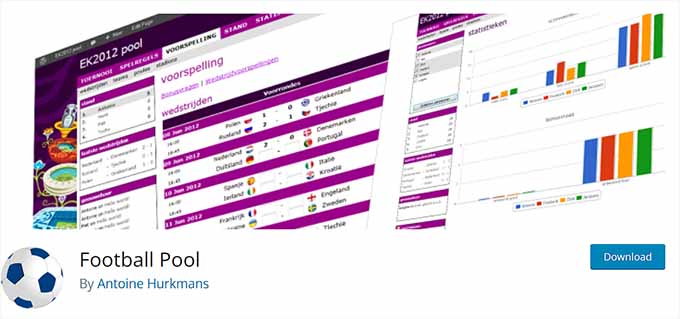

Football Pool is another fun WordPress plugin that adds a sports pool to your website. Here, users can predict the outcomes of matches and earn extra points.
You can select different leagues and tournaments that you want to add to your sports pool and add multiple prediction types like winner, score, or first goalscorer.
Football Pool also allows you to add registration forms so that users can log in to participate in the pool. Additionally, it displays a leaderboard showing the top participants based on points and users can view their own points on their profiles.
Pros
- The plugin is completely free.
- It comes with automatic points calculation, bonus questions, social media sharing, and email notifications.
- When we reviewed the tool, we found out that you can set deadlines for users to submit their predictions.
Cons
- It offers limited customization options.
- The plugin does not have great customer support.
Why we recommend Football Pool: If you have a WordPress blog related to sports, then this plugin can be a great way to add some fun elements to your site. It can encourage more users to log in regularly to submit their predictions and earn points, ultimately increasing traffic on your blog.
8. WPForms (Polls and Surveys)
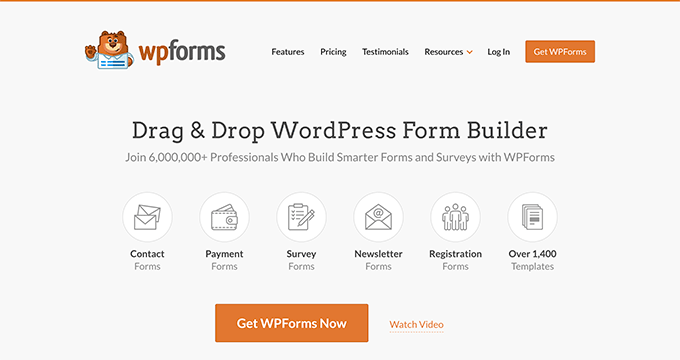

WPForms is the best WordPress contact form plugin on the market that you can use to add fun polls and surveys to your website.
It comes with a drag-and-drop builder, 1700+ premade templates, and complete spam protection, enabling you to build any kind of secure form you like.
You can easily add an interactive poll that can boost engagement and also help you gather feedback from your audience on different topics.
For more information, see our tutorial on how to create an interactive poll in WordPress.
Pros
- If you have a fitness blog, then you can add a fitness tracker or BMI calculator to your site.
- You can also connect your forms with any popular gateways like PayPal or Stripe.
- Upon testing, we discovered that the plugin lets you add progress bars, star ratings, and file upload fields to your forms.
Cons
- WPForms has a free plan, but some of the features are only available with the paid plugin.
Why we recommend WPForms: If you want to add polls and surveys to make your site more enjoyable for users, then WPForms is the best choice for you.
You can see our WPForms review for more information.
9. Smash Balloon (Embed Social Media Feeds)
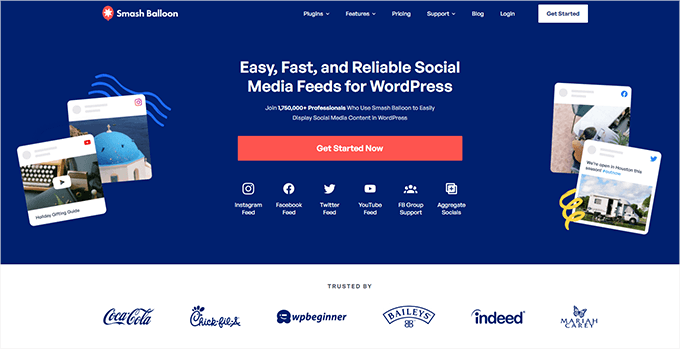

Smash Balloon offers a suite of different plugins that allow you to embed social media feeds into your website, including Instagram, Facebook, YouTube, TikTok, and Twitter.
These feeds can show a more fun side of your business to your website visitors, which can boost user engagement.
Adding a social wall feed is a good idea because it can motivate visitors to check your social media profiles, leading to more followers.
Smash Balloon comes with an intuitive feed editor, premade layouts, and multiple customization options for your feeds. If you have a YouTube channel, then you can even embed your YouTube live streams to increase site traffic.
Pros
- All the Smash Balloon plugins are completely mobile responsive.
- Smash Balloon lets you embed Facebook, YouTube, Twitter, or Instagram feeds without using any code.
- The plugins enable you to filter your feeds to display specific content and control what appears on your website.
Cons
- All the Smash Balloon plugins have free plans with limited features. To access advanced options, you will need the premium versions.
Why we recommend Smash Balloon: You can use any of the Smash Balloon plugins to showcase your social media feeds and display social proof on your website.
For more information, you can see our Smash Balloon review.
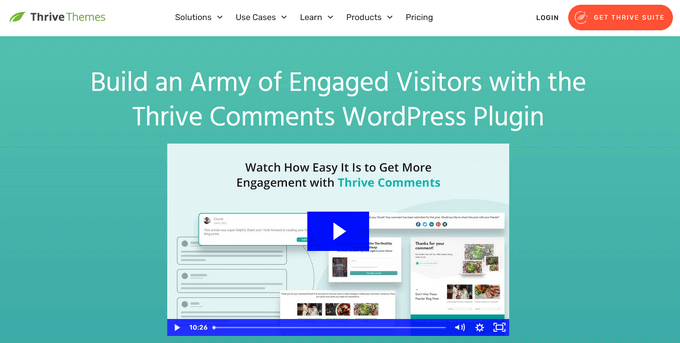

Thrive Comments is the best WordPress comments plugin that can gamify your comments section to boost engagement.
It comes with a built-in voting and badge feature that allows you to award points and badges to users based on different criteria. For instance, you can give a silver badge to users if they have 5 comments on your site and a gold one if they have 10.
Additionally, you can use the plugin to add a like/dislike functionality. This will discourage users from leaving spam comments.
For details, see our beginner’s guide on how to add a simple user ranking system for WordPress comments.
Pros
- It has a dedicated moderation area, provides analytics, and shows custom messages to users upon leaving their first comment. This can improve the user experience.
- The plugin allows users to subscribe to comments in WordPress.
- When we were testing it, we found out that Thrive Comments also enables users to leave comments using their Facebook or Google accounts.
- The plugin lets you feature interesting comments at the top of the section.
- It is a part of Thrive Themes and can integrate with other plugins from the suite.
Cons
- Thrive Comments does not offer a free plan.
- Its analytics and reporting feature is basic compared to some other tools.
Why we recommend Thrive Comments: If you want to use a fun WordPress plugin to add gamification to your comments section, then this is the perfect solution for you.
Thrive Comments allows you to award badges, add like/dislike icons, feature interesting comments at the top, and even allow users to subscribe to different comments.
11. myCred (Create a Points System)
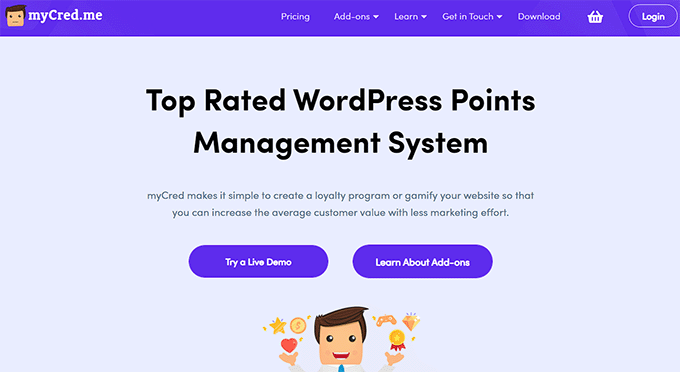

myCred is a WordPress points management plugin that can add a fun loyalty program or gamified system to your website.
You can use different hooks provided by the plugin to award points to users. For example, you can award points upon user registration, leaving a comment, submitting a guest post, making a purchase, and more. Then, you can reward your active users with coupons and discounts.
This can create brand loyalty among customers and increase conversions if you have a WooCommerce store.
To learn more, you can see our tutorial on how to add a points system in WordPress.
Pros
- It lets you add multiple point types and award points automatically when the user performs the required action.
- The plugin allows users to check their points balance and history.
- You can award discount coupons, freebies, and exclusive offers to users upon achieving certain points. We particularly liked the badge feature that you can use to award badges and appreciate users when they reach different levels.
- myCred lets you create a leaderboard to display the top point achievers.
Cons
- Its free plan has limited features.
- Using a lot of the addons offered by the plugin can sometimes hurt your site speed.
- Setting up the plugin can be complex because it has a lot of features.
Why we recommend myCred: If you want to add a points system to your WordPress website, then this is the best fun plugin for you. It will help build loyalty and ultimately generate leads.
12. Chartify (WordPress Charts)
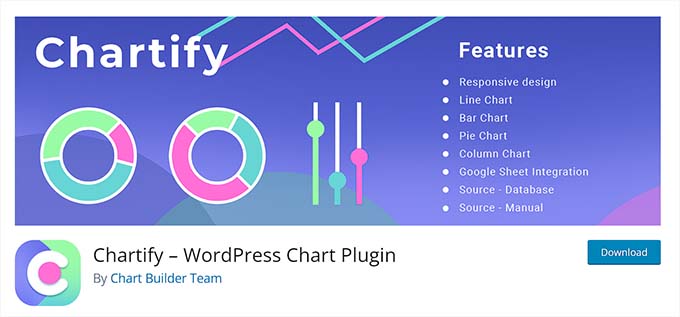

Chartify is another fun WordPress plugin. It helps you build all kinds of charts for your website, including bar charts, pie charts, column charts, donut charts, histograms, and so much more.
The plugin is completely free and allows you to modify the visual effects for your charts like color, font, labels, and titles.
Plus, it shows a live preview so you can see all the changes you made in real time.
Pros
- It allows you to enter data directly within the plugin.
- Chartify lets you import CSV files and connect with Google Sheets.
- You can easily integrate any chart using the block in the Gutenberg block editor.
Cons
- Adding a lot of charts can increase your page load time.
- It does not come with any advanced features to build charts.
Why we recommend Chartify: If you want to add a fun element to your blog posts, then you can use Chartify. It will help you build all kinds of visually appealing charts that can make your articles a more interesting read for users.
13. Confetti (Confetti Effect)


Confetti is a super fun WordPress plugin that adds a confetti effect to your website using a block.
It has a free plan, is easy to use, and allows you to customize the color and size of the confetti as well.
Additionally, upon review, we discovered that it offers different kinds of confetti effects, including fireworks, school pride, falling, realistic cannon, and more.
Pros
- The plugin can integrate with WooCommerce, WPForms, MemberPress, LearnDash, Formidable Forms, and more.
- You can configure the plugin to show the confetti effect when you scroll to a specific point on a page.
- It also provides a preview of all the effects before you add them to your site.
Cons
- The plugin is basic and does not offer any advanced features.
- You can only integrate the plugin with other tools once you upgrade to the pro version.
Why we recommend Confetti: If you are announcing a winner for a competition or just want to add a visually appealing effect to your blog, then Confetti can be a great choice.
Which Is the Best Fun WordPress Plugin?
In our expert opinion, OptinMonster is the best fun WordPress plugin because it lets you add a spin-the-wheel popup on your page. This makes your website more engaging and can also help you collect leads.
However, if you want to host a competition or giveaway, then RafflePress should be your go-to option. On the other hand, if you want to use FOMO to boost conversions, then you can choose TrustPulse instead.
Similarly, if you want to add personality quizzes or polls, then we recommend Thrive Quiz Builder and WPForms.
Frequently Asked Questions About Fun WordPress Plugins
Here is a list of some questions that are frequently asked by our readers:
What is the most popular WordPress plugin?
WPForms is one of the most popular WordPress plugins, with over 6 million active installations.
It is the best form builder on the market that comes with a drag and drop builder, 1700+ premade templates, and complete spam protection. You can use it to create any kind of form you like, including contact forms, registration forms, login forms, online order forms, and more.
Will these fun WordPress plugins slow down my website?
Using a poorly-coded plugin can slow down your website. However, we have thoroughly tested all the plugins on our list to make sure that they are updated regularly and optimized for speed.
Still, you must keep in mind that using a lot of plugins at the same time can slow down your website. We recommend choosing only 3 to 4 fun plugins to boost engagement.
Is it okay to use multiple plugins on my website?
You can add a few well-chosen plugins to make your site more enjoyable. However, you must keep in mind that too many plugins can clutter your site and overwhelm visitors.
That is why we recommend choosing plugins that complement each other and do not have overlapping functionalities.
For more details, you can see our tutorial on how many WordPress plugins you should install and how many are too many.
Related Guides to Fun WordPress Plugins
If you liked this article, then please subscribe to our YouTube Channel for WordPress video tutorials. You can also find us on Twitter and Facebook.
-

 WORDPRESS6 days ago
WORDPRESS6 days ago9 Best WooCommerce Multi Vendor Plugins (Compared)
-

 SEO6 days ago
SEO6 days agoGoogle March 2024 Core Update Officially Completed A Week Ago
-

 MARKETING5 days ago
MARKETING5 days agoNavigating the Video Marketing Maze: Short-Form vs. Long-Form
-

 SEARCHENGINES6 days ago
SEARCHENGINES6 days agoGoogle March 2024 Core Update Finished April 19, 2024
-

 SEO7 days ago
SEO7 days agoGoogle Declares It The “Gemini Era” As Revenue Grows 15%
-
![The Current State of Google’s Search Generative Experience [What It Means for SEO in 2024] person typing on laptop with](https://articles.entireweb.com/wp-content/uploads/2024/04/The-Current-State-of-Googles-Search-Generative-Experience-What-It.webp-400x240.webp)
![The Current State of Google’s Search Generative Experience [What It Means for SEO in 2024] person typing on laptop with](https://articles.entireweb.com/wp-content/uploads/2024/04/The-Current-State-of-Googles-Search-Generative-Experience-What-It.webp-80x80.webp) MARKETING6 days ago
MARKETING6 days agoThe Current State of Google’s Search Generative Experience [What It Means for SEO in 2024]
-
SEARCHENGINES5 days ago
Daily Search Forum Recap: April 26, 2024
-

 WORDPRESS6 days ago
WORDPRESS6 days agoNew WordPress.com Themes for April 2024 – WordPress.com News




